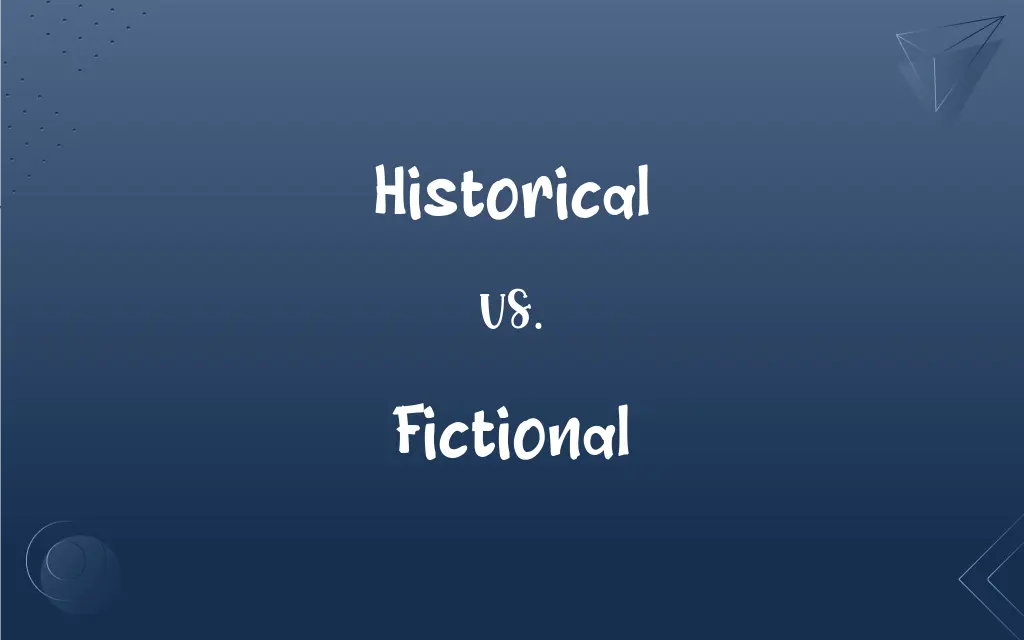Historical vs. Fictional: What's the Difference?
Edited by Aimie Carlson || By Harlon Moss || Published on November 11, 2023
Historical means relating to past events. Fictional means imaginary or invented, not real.

Key Differences
Historical content is based on real events, people, or eras from the past. It represents factual occurrences and is often supported by evidence. Fictional content, on the other hand, is born from imagination. It may include made-up characters, events, or settings, not constrained by historical accuracy.
Historical narratives aim to portray or interpret past realities, often shedding light on societal, cultural, or personal histories. Fictional stories, while they may draw inspiration from real life, prioritize creativity and artistic expression, sometimes even challenging reality.
Historical works are frequently used for educational or documentary purposes, striving to maintain authenticity and factual integrity. Fictional works provide entertainment, moral lessons, or speculative explorations, with freedom from factual confines.
Historical literature, films, or articles are often scrutinized for accuracy and may influence our understanding of past events. In contrast, fictional creations are evaluated more on their narrative, emotional impact, or artistic qualities rather than factual correctness.
Historical accounts can sometimes be subjective, influenced by the author's perspective, but they strive to adhere to real-world evidence. Fictional accounts, embracing the realm of imagination, allow for complete artistic liberty, often bending or reimagining reality to serve the story.
ADVERTISEMENT
Comparison Chart
Basis
Real events, people, or eras
Imaginary or invented
Purpose
Educate, document, interpret
Entertain, speculate, explore
Constraint
Factual accuracy, evidence
Creative freedom
Evaluation
Accuracy, authenticity
Narrative, artistic quality
Influence
Shapes understanding of past
Invokes imagination
ADVERTISEMENT
Subjectivity
Limited, evidence-based
Unlimited, imagination-based
Historical and Fictional Definitions
Historical
Concerned with history.
He is a historical novelist known for his meticulous research.
Fictional
Imaginary or invented.
The fictional character of Sherlock Holmes has become iconic.
Historical
Having significance in history.
The historical treaty marked the end of the war.
Fictional
Not real, made-up.
The story is set in a fictional town that resembles her hometown.
Historical
Based on factual occurrences.
The historical drama depicted the life of a famous queen.
Fictional
Created for storytelling.
The novel introduces a fictional universe with unique laws.
Historical
Relating to past events.
The museum showcased historical artifacts from ancient civilizations.
Fictional
Not based on fact.
The movie is purely fictional, with no relation to actual events.
Historical
Authentic representation of the past.
The documentary provided a historical account of the expedition.
Fictional
Used in literature or art.
The painting depicted a fictional landscape from the artist’s imagination.
Historical
Of or relating to history; concerned with past events
A historical account.
Fictional
The category of literature, drama, film, or other creative work whose content is imagined and is not necessarily based on fact.
Historical
Based on past events or set in the past
A historical novel.
Fictional
Works in this category
The fiction of Virginia Woolf.
Historical
Used in or providing evidence of the past
Historical costumes.
Historical records.
FAQs
How important is accuracy in historical works?
Accuracy is crucial in historical works as they aim to represent or interpret real past events.
What is the main characteristic of fictional works?
Fictional works are primarily characterized by their imaginative or invented content.
What is historical fiction?
Historical fiction is a genre that combines factual historical context with fictional characters or stories.
What makes a work historical?
A work is historical if it is based on real events, people, or periods from the past.
Can fictional stories contain historical references?
Yes, fictional stories can contain historical references or settings but are not constrained by historical accuracy.
Do fictional works always involve fantasy elements?
Not always. Fictional works can be realistic but are not limited to real-life occurrences.
Can fictional characters be based on real people?
Yes, fictional characters can be inspired by or loosely based on real people.
Can historical works include fictional elements?
Yes, historical works can include fictional elements for narrative purposes, but they generally adhere to factual accuracy.
Are all novels considered fictional?
Yes, novels are typically fictional, though they may contain historical or real-life elements.
Are fictional works considered less valuable than historical works?
No, fictional works are not considered less valuable; they serve different purposes like entertainment and speculation.
Is it necessary for fictional works to be completely original?
Not necessarily. Fictional works can draw inspiration from real life but are not bound to originality.
Why is it important to distinguish between historical and fictional works?
It's important to distinguish between them to understand what is factual and what is a product of imagination.
Is it necessary for fictional works to have a plot?
Most fictional works have a plot, but some may focus more on character development or thematic exploration.
Can historical works be subjective?
Historical works can have subjective elements but generally strive to be based on evidence and fact.
Can historical works be entertaining?
Yes, historical works can be entertaining while providing educational value.
Can a historical account be completely unbiased?
While striving for objectivity, historical accounts may still reflect some level of the author's perspective.
What is the significance of historical accuracy in films?
Historical accuracy in films is significant as it affects how audiences perceive and learn about past events.
How do historical works impact society?
Historical works can impact society by influencing our understanding and perspective of past events.
Can historical events be depicted in fictional works?
Yes, historical events can be depicted in fictional works but are often adapted for narrative purposes.
How does fiction contribute to culture?
Fiction contributes to culture by stimulating imagination, reflecting societal issues, and providing entertainment.
About Author
Written by
Harlon MossHarlon is a seasoned quality moderator and accomplished content writer for Difference Wiki. An alumnus of the prestigious University of California, he earned his degree in Computer Science. Leveraging his academic background, Harlon brings a meticulous and informed perspective to his work, ensuring content accuracy and excellence.
Edited by
Aimie CarlsonAimie Carlson, holding a master's degree in English literature, is a fervent English language enthusiast. She lends her writing talents to Difference Wiki, a prominent website that specializes in comparisons, offering readers insightful analyses that both captivate and inform.







































































